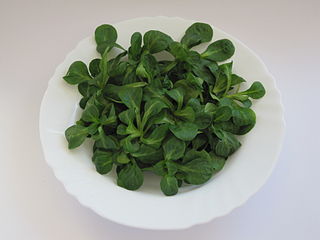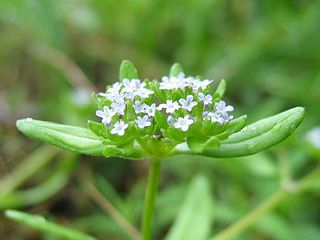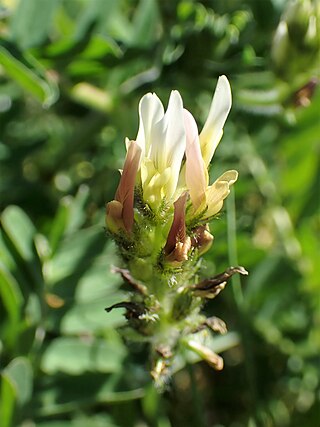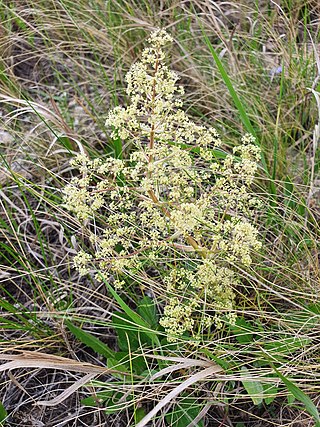
The Caprifoliaceae or honeysuckle family is a clade of dicotyledonous flowering plants consisting of about 860 species in 33 to 42 genera, with a nearly cosmopolitan distribution. Centres of diversity are found in eastern North America and eastern Asia, while they are absent in tropical and southern Africa.

The Valerianaceae Batsch, the valerian family, was a family of flowering plants that is now considered part of the Caprifoliaceae. Plants are generally herbaceous, and their foliage often has a strong, disagreeable odor. They are found native in most regions of the world except for Australia. Some species are cultivated as ornamentals or used in herbal medicine for inducing relaxation and sleep.

Valeriana locusta, commonly called mâche, cornsalad, or lamb's lettuce, a small, herbaceous, annual flowering plant in the honeysuckle family Caprifoliaceae. It is native to Europe, western Asia and north Africa, where it is eaten as a leaf vegetable.
Valeriana extincta is an extinct species of flowering plant in the family Caprifoliaceae. It was an annual endemic to Jebel Ma’alih, a mountain in northwestern Socotra, Yemen.

Valerianella is a genus of flowering plant in family Caprifoliaceae. It includes 23 species native to the Mediterranean Basin of southern Europe and North Africa, western and central Asia, Madeira and the Azores, and Ethiopia and Kenya. Many species formerly placed in Valerianella, including those native to the Americas, have been moved to Valeriana. Plants of Valerianella and Valeriana are sometimes known by the common name corn salad or cornsalad.

Valeriana nuttallii, or Nuttall's cornsalad, is a small dicot annual plant of the family Caprifoliaceae which can be found growing within the United States in areas of Oklahoma and Arkansas.

Valeriana congesta, synonym Plectritis congesta, is a species of flowering plant in the honeysuckle family. It is known by several common names, including shortspur seablush and rosy plectritis. It is native to western North America.

Valeriana woodsiana, common name beaked cornsalad, is a plant native to the United States. It is an annual self pollinating flowering plant and besides being edible there are no known uses. Valerianella radiata flowers from April- May.

Valeriana ozarkana is a species of flowering plant in the honeysuckle family known by the common names Benjamin Franklin bush or Ozark cornsalad. It is found in Arkansas, Missouri and Oklahoma in the United States.

Valeriana arkansana is a species of flowering plant in the honeysuckle family known by the common name Palmer's cornsalad. It is found in Arkansas and Oklahoma in the United States.

Valeriana dentata is a species of flowering plant belonging to the family Caprifoliaceae. It is an annual native to North Africa, Europe, and parts of western and central Asia east to the western Himalayas.

Astragalus boeticus, the yellow milk vetch, or Swedish coffee is a species of annual herb in the family Fabaceae. It is native to the Mediterranean and the Middle East.
Bifora radians, the wild bishop, is a species of annual herb in the family Apiaceae. They have a self-supporting growth form and simple, broad leaves. Individuals can grow to 31 cm tall.

Valeriana calcitrapae is a species of annual herb in the family Caprifoliaceae. Individuals can grow to 18 cm tall. It is native to the Mediterranean Basin, Crimea, and Macaronesia.

Valeriana graciliflora is a species of flowering plant in the family Caprifoliaceae. It is an annual native to Algeria, the Balearic Islands, mainland Greece and Crete, mainland Italy and Sicily, Libya, and Tunisia. It has been introduced to Corsica, France, Mauritius, and Sardinia.
Sabulina mediterranea is a species of flowering plant in the family Caryophyllaceae (carpetweeds). It is an annual native to the Mediterranean Basin region, including parts of southern Europe, north Africa and western Asia.

Valeriana eriocarpa is a species of flowering plant in the family Caprifoliaceae. It is an annual native to western and southern Europe, northwestern Turkey, and north Africa.

Valeriana umbilicata, known by the common name navel cornsalad. It is a dicot, annual plant in the flowering plant family Caprifoliaceae. It is native to the Eastern North America and some parts of Canada and has no known uses other than being edible.

Trinia is a genus of flowering plants in the family Apiaceae, native from Europe to Iran and western Siberia. The genus was first described by Georg Franz Hoffmann in 1814.
















